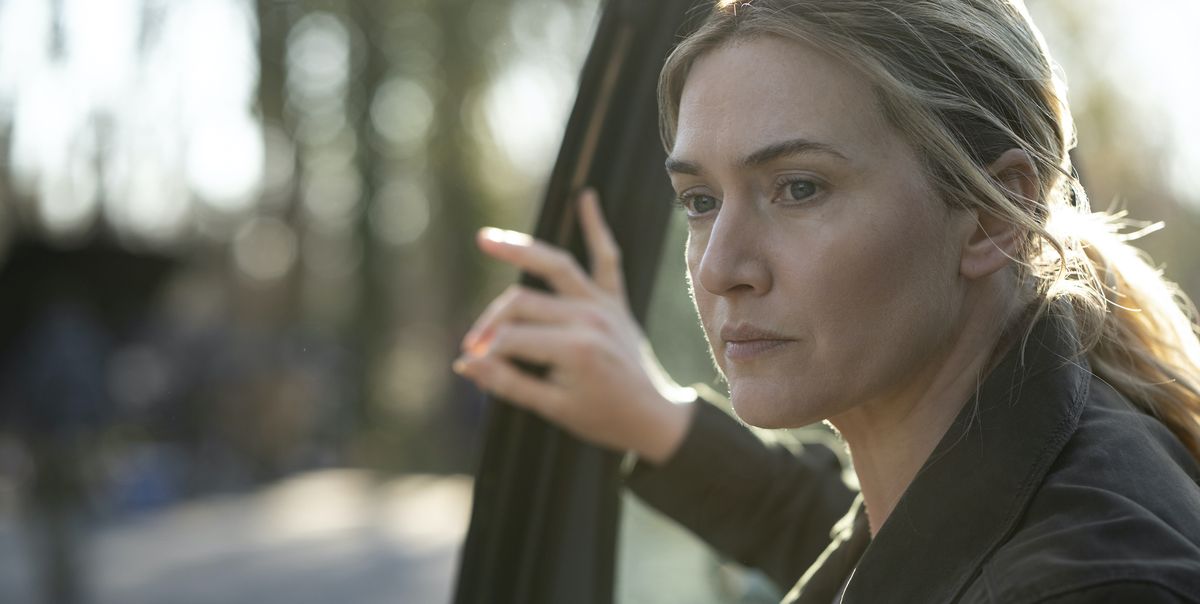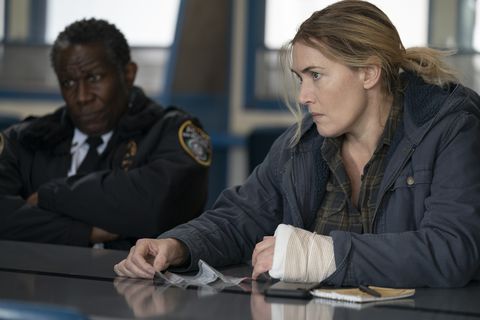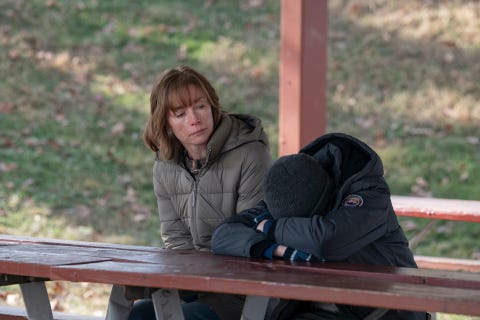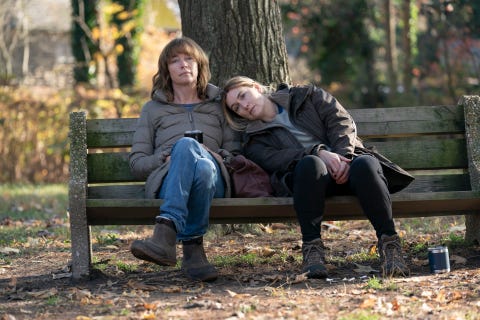Warning: spoilers for the finale of Mare of Easttown ahead.
By the time Mare of Easttown’s season finale draws to its much-anticipated close, you’d be hard-pressed not to admit the saga needed to end this way. After spending the past six weeks debating the hundreds of theories that circulated after each episode of the HBO detective drama aired, we finally have an answer. We know Erin McMenamin’s murderer, and he’s not an abusive father, a disgraced deacon, a cruel ex-boyfriend, or even an alcoholic first cousin once removed. He’s a child.
There’s inherent shock value in making your killer a kid, à la Sharp Objects, but Mare of Easttown writer and creator Brad Inglesby says he was going for something less grimy when he landed on Ryan Ross as culprit. “It spoke to the show in a way that I felt was really organic,” he explained.
Prior to the finale airing, ELLE.com met with Inglesby to learn how and why he decided on this shocking turn of events. But first, we needed to walk through the events of the tumultuous episode 7, “Sacrament.” Let’s dive in.
Last week we watched Mare Sheehan (Kate Winslet) race to Billy (Robbie Tann) and John Ross’s (Joe Tippett) favorite fishing spot, after learning from Lori Ross (Julianne Nicholson), John’s wife, that Billy and Erin (Cailee Spaeny) were once in an incestuous relationship. According to Lor, their romance ignited at the Ross family reunion, during which Erin and her father were staying in Billy’s cabin. From that encounter, Erin became pregnant with Billy’s son, DJ, and Billy eventually murdered her to keep their affair a secret.
But as “Sacrament” opens and we watch Mare steel herself for a confrontation with the Ross brothers, the scene cuts to the police station, where Jess (Ruby Cruz), Erin’s best friend, has just given Chief Carter (John Douglas Thompson) a game-changing clue: a photograph pulled from one of Erin’s journals.
Mere seconds into the finale, the camera finally gives the audience a clear view of the photo. In it, Erin sits in bed beside not Billy, but John, the two of them clearly enjoying some post-coital cuddling.
Chief Carter asks Jess if Dylan (Jack Mulhern), Erin’s ex-boyfriend, knows that DJ is John’s son. Jess says no. She convinced Dylan to help her burn Erin’s journals, in part to keep John’s secret, Jess reveals, but also to keep DJ in the care of Dylan’s parents. She thought Erin would have wanted that.
But back by the river, Mare doesn’t have any of this context. She stumbles into the water, where John is holding a gun at Billy, convinced he must kill his brother to ensure the truth doesn’t come out. “Everyone thinks I killed her anyway,” Billy scoffs, demanding that John shoot him. “Who’s going to miss a fuck-up like me? You said you got a family, and I’ve got nobody.”
Mare arrives in the nick of time and aims her own gun at John, who, desperate, yanks it up to his temple. Billy wrestles him to the ground before he can pull the trigger, extracts the gun, and Mare swipes it away as Billy admits, “I didn’t do it, Mare.”
Cut to the station, where John unravels his tale with surprising ease: He and Erin began a “sexual relationship” at the Lake Harmony family reunion, yes. It’s pathetic reasoning for adultery and statutory rape, but John says the two of them shared a real bond. “We were both having a hard time,” he appeals to Mare and Chief Carter. “She was having problems at home; things between me and Lor weren’t great. We could confide in each other in ways that we couldn’t confide in other people. I mean, we had this connection.” At this, Chief Carter gives an appropriately skeptical deadpan, and John realizes he’s not going to earn any sympathy here. Go figure.
You can guess the rest: Erin got pregnant, chose to have the baby despite John’s wishes, and let Dylan assume he was DJ’s dad.
But on the night of January 10th, John was over at Frank’s (David Denman) engagement party. After she was assaulted that same evening, Erin called John multiple times demanding they speak and threatening to tell Lori the truth if he didn’t agree to meet at Brandywine Park. So he went, and found her with a gun in her hand, furiously insisting he pay for DJ’s ear surgery. She threatened to shoot herself, and John tackled her, trying to seize the gun; instead it went off, blowing off her finger. Then, in the shock of the moment, John whirled around and shot her in the head.
Our first moment of pause should come when John says Erin wanted to shoot herself. We know that Erin had dreams, that she was deeply devoted to DJ, that she had shown no prior signs of suicidal ideation. And Inglesby agrees—he intentionally wanted the audience to know Erin well enough at this point to recognize holes in John’s story. Making Erin well-rounded and recognizable was an attempt to subvert the trope of the “dead teenage girl without a personality” that characterizes so many detective dramas.
“We can’t just open episode one, here’s the body of a girl, and that is the impetus, or that’s the catalyst that’s going to carry us through,” Ingelsby told ELLE. Instead, he decided: “‘Okay, let’s engage with Erin, and let’s get to know her as a human being, her anxieties, her fears, her hopes, her dreams, and let’s have an audience engage with her in a way that maybe other shows haven’t.’”
But, at this point in the finale, Mare and Chief Carter believe John’s statement: that, following the accidental murderer, he returned to Frank’s engagement party and drove Frank and his fiancée home. That he called Billy to help him move Erin’s body into the woods where she was assaulted, so the police would believe one of the kids who assaulted her also killed her. That he convinced Lori to lie to Mare on John’s behalf.
Sickened and numb, Mare visits Deacon Mark (James McArdle)—the charges against him have been dropped—and John goes to arraignment. On his way out of the courtroom, he gets a few moments with his wife, whom he asks to raise DJ. Reluctant, she agrees.
At this point, Mare is exhausted, but she seems to have done her job: The case is solved, and the culprit behind bars. But neither Mare herself nor any of us watching feel satisfied—and Ingelsby wanted it that way. “I was able to kind of carefully have an audience leaning one way and then another way and get them through the story,” he explains. “But then, obviously, knowing that there needs to be a big set piece somewhere that’s shocking that gets an audience’s adrenaline going. That was the most important part.”
That adrenaline shot doesn’t come, however, until much later in the episode, after Mare has done a little ruminating on the evidence: John describes the gun he supposedly used to kill Erin was a “regular ‘ole handgun,” which doesn’t match what the ballistics expert discovered—that it was a Colt Detective Special. And Sandra Elliot, the woman he was supposedly cheating on Lori with only a few weeks ago, tells Mare they haven’t been together in five years. Something’s off, and Mare knows it. But she lives with it until weeks later, when she gets a call from Glen Carroll (Patrick McDade).
He’s not doing so well since his wife died; the dishes are piling up in the kitchen, and he can’t seem to keep track of his possessions. That’d be normal for an aging man grieving his late wife, except that his gun went missing a few weeks ago, oddly enough. Slowly growing alarmed, Mare asks what kind of gun it was, and who has access to the shed where it’s kept. Why, it’s a Colt Detective Special, Mr. Carroll explains. And, uh, only the kid who cuts the grass: Ryan Ross, John and Lori’s son.
Horrified, Mare races into the house to check Mr. Carroll’s security camera footage, and there it is: Ryan Ross, biking into the backyard, opening the shed, and stealing the gun. Mare releases an anguished cry.
Eventually, she catches up to Ryan—during an especially heart-wrenching scene in which she must face Lori, who has obviously been covering for him, not John, this entire time—and takes him in for questioning. She, a mother who lost her son, must take a son from his mother. It’s poetic, in a searing, unbearable sort of way.
Inglesby says he didn’t know when he started writing Mare of Easttown that Ryan would end up as his killer. “I started putting the pieces [of this show] together,” he says, “but I refused to write it because I was like ‘I don’t have a good ending.’ And I know I’ve watched these crime shows—and I love them—but I know that a lot of it is, you have to kind of nail the ending. Because, otherwise, the audience goes, ‘Man, I wasted all these hours of my life… The key was knowing I had to know the ending, and it took me a long time to know the ending.”
But those pieces came together when Ingelsby realized that, as a child, Ryan was a face of innocence. Because one of the show’s major themes is mercy, Ryan’s crime would need to be an accident. And so it is: Ryan tells Mare that, when he learned about the incestuous affair between Erin and his dad, he confronted John. John said it was a mistake, and Ryan promised h’’d keep the secret so long as John ended the relationship. But the affair wasn’t quite over—at Frank’s engagement party, Ryan discovered Erin’s texts on John’s phone, and responded on behalf of John, agreeing to meet her at Brandywine Park. When he got home, he biked to Mr. Carroll’s house, stole the gun he’d discovered one day in the shed, and rode to Brandywine.
He only meant to frighten Erin into leaving his family alone, he says. And frighten her he did, enough that, when she got out of Deacon Mark’s car and discovered Ryan at the park, holding a gun to her head, she attempted to steal it away from him. Like in John’s not-quite-true testimony, the gun went off. Ryan panicked, and shot Erin in the head. Immediately after, panicked, he returned the gun to Mr. Carroll’s shed and called his father, who enlisted Billy to help move Erin’s body into the woods.
At the station, Lori tells Mare she only learned the truth recently. Early on, she’d assumed that Ryan was getting into fights at school because he’d caught his father with Sandra Elliot again. She didn’t know the real story until John admitted it to her weeks later, at the kitchen table, begging her to tell Mare the murderer was Billy. “I agreed to lie to protect my son,” she tells Mare. “And I would have taken that to my grave if you didn’t show up at the house today.” The tone is accusatory, perhaps unfairly so, but what other tone would a distraught mother take?
Later, Mare climbs into Lori’s car, where her friend is in the midst of a hysterical breakdown. Mare attempts to breach the unfathomable gap between them, but Lori rears back. “Don’t fucking touch me,” she says. “Why couldn’t you just leave it alone? It’s Ryan. It’s Ryan! It’s my Ryan! My Ryan! It was an accident. He doesn’t even know how to hold a gun. My whole family is gone now because of you. Get away from me. I don’t want to see you again.”
This is Mare’s closest and dearest friend. And now she’s lost that relationship, too.
The show had to come to this gut-wrenching pinnacle, Ingelsby explains. It simply made the most sense. Ryan, like Mare’s son, Kevin, was a child who—intentionally or unintentionally—made a tragic mistake. For Kevin, it was drugs, which eventually led to his death. For Ryan, it was murder. And yet both Mare and Lori love their children deeply, and must learn to live with that love in the wake of their child’s absence.
“One of the things I was really interested in the show was this study of mercy, the importance of mercy and compassion and humanity,” he says. “And I knew that the ending had to be, Mare has to confront the thing that’s haunting her by having mercy on herself. And so then it was like, Okay, if you look at the ending episode, what’s the ultimate act of mercy? Literally loving a child that has caused her own [downfall], basically. That’s the ultimate act of mercy, right? [Both Mare and Lori] going ‘I’m going to love the child that has ruined my family.’
“The most heartbreaking of all [the options] was having Ryan as the killer. It’s devastating, and so it just felt like it gave me the most conflict and emotion at the end of the show.”
Did Inglesby did worry that, given the numerous lengthy theories fueling Reddit boards and articles like mine, viewers might guess the killer was Ryan?
“Our tightrope walk all along was that you had to have enough of him so, when it came at the end, you knew him as a character and you had the seeds planted,” Inglesby says. “I think the greatest worry I had was that, we would get to episode 7 and go, ‘It’s Ryan,’ and the audience would think, ‘I don’t even know who that is. We haven’t even seen him.’ So it was a balancing act of having to have enough clues where an audience might suspect him, so when you got to the ending they wouldn’t go, ‘That was just out of nowhere. You tricked us the whole time.’”
Part of Ingelsby’s push to make the murderer a central figure in the Easttown community was grounded in his own love of that community. He grew up in Pennsylvania, “drinking Rolling Rock and drinking Yuengling beer, eating cheese steaks every Friday night at the local pizza shop,” he says. He had a friend who told him about the police station where he worked—a tiny unit with 11 other officers and one detective in charge of the whole community. That image stuck with him.
“A woman who has to uphold the duty of this job, but also has to deal with people that she has these personal relationships with and shared history with, which complicates things,” he says. “That was sort of the nugget of it.”
And making Ryan the murderer fit perfectly within that conflict. Ryan would be the son of Mare’s best friend, part of a family she cares about deeply. He would also have killed a young woman, and Mare would not be the kind of cop to give up on a case. The result would be a terrible but resonant fissure, one that would finally open the pathway for Mare to confront her own grief.
“I hope the audience will be surprised,” Inglesby says. “I think some people will be, some people won’t be, but I think more than that, I hope they’re moved emotionally by the ending. If we can hide the secret, great. But more importantly, I want the audience to remember the characters and the emotion and the relationships in the show.”
This content is created and maintained by a third party, and imported onto this page to help users provide their email addresses. You may be able to find more information about this and similar content at piano.io




